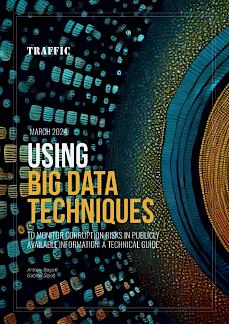
© Beautiful Destinations
i
strengthening anti-corruption knowledge and practice
Corruption throughout supply chains for wildlife, forests and fisheries is a major obstacle to global transitions towards legal and sustainable trade and harvesting.
Recent high level commitments, such as those made during the London Conference on illicit financial flows and the resolution on corruption adopted by Parties to the Convention on International Trade in Endangered Species of Wild Flora and Fauna (CITES), have boosted international efforts to understand and identify corruption, and to develop approaches to reduce the threats that it poses to biodiversity. The Targeting Natural Resource Corruption (TNRC) project brings together expertise in both conservation and anti-corruption from a consortium led by World Wildlife Fund (WWF) with the U4 Anti-Corruption Resource Centre at the Chr. Michelsen Institute, TRAFFIC, and the Terrorism, Transnational Crime and Corruption Center (TraCCC) at George Mason University.
for more information and project resources, visit the
TNRC website
the challenge we face
Targeting corruption is one of the largest conservation and development challenges within natural resources sectors.
Corrupt practices in the governance and management of natural resources result in the misuse or outright theft of public revenues, environmental degradation, reduced economic growth and enduring poverty. Corruption undermines public trust in state institutions and facilitates criminality, insecurity, and even war. It distorts good governance and effective decision making, and it drives the allocation of resources away from the public good and into private hands, adversely impacting both people and biodiversity
related news and reports to TNRC
explore news items and recent publications related to our work under the TNRC project
latest reports and materials
View the latest resources here in our joint efforts to address the corruption that facilitates wildlife trade.
Visit our resource library for the full TRAFFIC publication archive.
strategic approaches
The TNRC project core work focuses on three strategic approaches, including a review of existing knowledge and lessons, alongside launching new field research, and targeting international-level agenda-setters and influencers.
Build knowledge
- Review existing anti-corruption knowledge and make it relevant and available to NRM practitioners
- Develop rigorous new evidence on the conditions under which tailored anti-corruption approaches can be effective to reduce corruption in NRM
- Disseminate knowledge to influence practice
Communicate for action
- Engage networks and partnerships to exchange knowledge and amplify the reach of anti-corruption information to promote change
- Empower others to implement anti-corruption initiatives at the country level
Apply knowledge and test hypotheses
- Limited pilots to test new approaches and evidence and feed knowledge back into the research and outreach under the Leader Award
- Broader application of anti-corruption interventions under Associate Awards
the partnership
TRAFFIC, WWF, U4 ACRC and TraCCC are combining our expertise to help NRM practitioners reduce opportunities for corruption in natural resource management.



thank you

This content is made possible by the generous support of the American people through the United States Agency for International Development (USAID). The contents are the responsibility of TRAFFIC and do not necessarily reflect the views of USAID or the United States Government.







